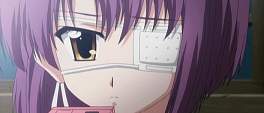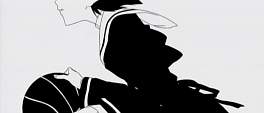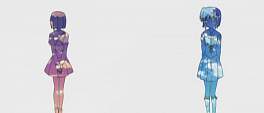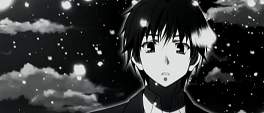With signature aplomb, SHAFT take up art-duties with ef - a tale of memories and craft a typically stylish and coy introduction to an intriguing and melodramatic series. Long shadows and open skies, stark lines and silhouetted profiles, the art direction obscures the sedate story and mundane characters but the potential for things much greater is too enticing to pass up.
ef - a tale of memories pitches itself somewhere in between school drama and supernatural, School Days and Sola; it has the straight faced drama of School Days but more playful, with the fantasy hints of Sola except less blatant. The first episode can best be described as confusing: cutting back and forth between full colour, grayscale, black and white and all points in between seemingly at random then leaping forwards or backwards through time with nary a keystone to right oneself. It conjures up thoughts of Soultaker and the premise being the weirdness rather than coherence; thankfully these thoughts are allayed in the second and third episodes which deftly sculpt the story, rarely allowing itself to be pre-empted by the viewer. It doesn't so much tone-down the oddness as spread it more thinly. The abandon shown for chronology is more telling as certain characters and traits are in one arc and not the other, wordlessly foreshadowing momentous events on the horizon.
The introductory episodes are concerned primarily with Hiro Hirono who, while young, met a girl whose memory malfunctions, then while older meets a delinquent girl after her bag is stolen. While simplistic, the duality of the plot is superbly portrayed and promises to culminate further through the series; it's also gratifying to see a significant revelation in the first hour of viewing, rather than protracted and fatiguing avoidance, it alludes to greater exposition if this is uncovered so early. This is of course the big detraction from the series in that its promise of greatness lies in an indeterminate period, like a carrot on a stick the viewer is expected to follow unquestioningly until ef is ready to reveal its cards.
This kind of pacing is acceptable but expects an investment in the characters and story and while there is no reason to doubt any of the parties involved with the series' creation, it's difficult to recommend following week-by-week when the payoff is all but ensured. With that in mind, it's easier to pluck detrimental elements; the characters both past and present are sometimes infuriatingly obtuse, communicating through enigmatic monologues or understated emotions. Other times the flawless styling can feel symbolic and justified while at others just auteur whimsy. The irony of watching ef is that there is no telling whether all these gripes will be meaningless come the end of series retrospective or whether they will be valid and long running detractions.
It is unfair to judge a series solely on what it may or may not promise in the future and on a face-value basis, ef - a tale of memories is a bit of a hodgepodge. It blatantly values style over substance, telling a criminally short amount of story very well and while the style is superlative, the character design is less than interesting and relies upon hair style to differentiate them (unfair perhaps given two of the core protagonists are twins). The series is easy to write off as a mind-fuck, borrowing more from that genre than it wants to admit and it lacks the buoyant exhilaration of other recent SHAFT shows; but at its core, ef is nothing more than a very pretty, very poised school drama; time will tell whether the narrative will break free from gimmicky time-cuts and provide something more substantial.







